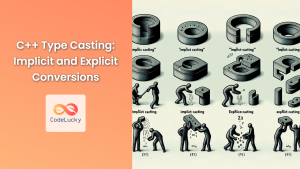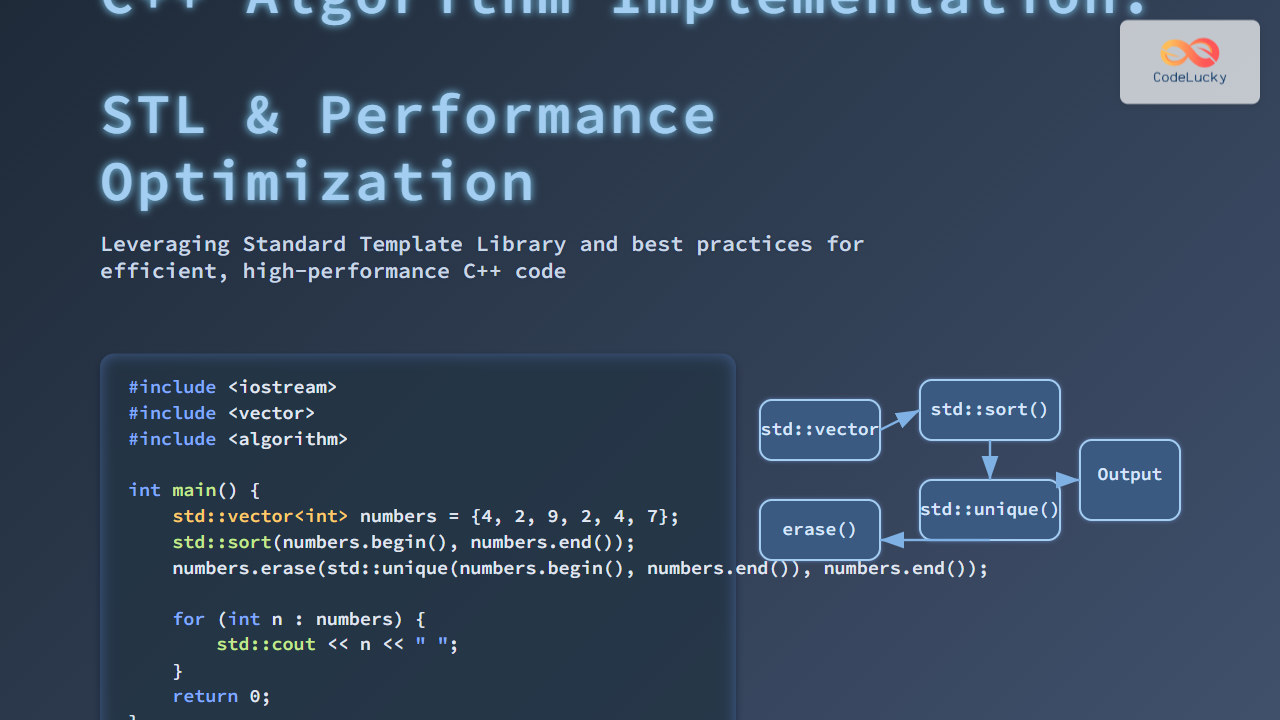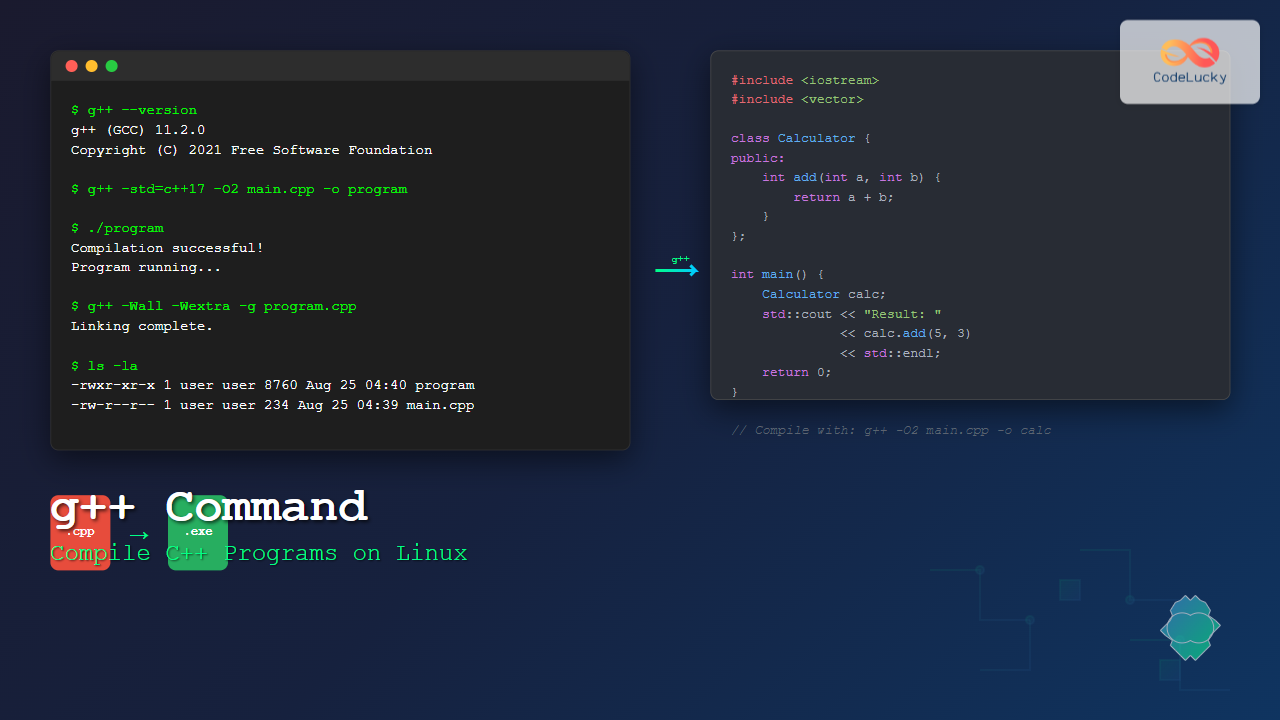In the world of C++ programming, type traits are powerful tools that allow developers to obtain information about types at compile-time. This feature, introduced in C++11 and expanded in subsequent standards, provides a way to perform compile-time logic based on type characteristics. In this comprehensive guide, we'll explore C++ type traits, their applications, and how they can enhance your code's efficiency and flexibility.
Understanding Type Traits
Type traits are template classes that provide information about types. They are part of the C++ Standard Library and are defined in the <type_traits> header. These traits can be used to query properties of types, perform type transformations, and make compile-time decisions based on type information.
🔍 Key Point: Type traits operate at compile-time, which means they incur no runtime overhead.
Let's start with a simple example to illustrate how type traits work:
#include <iostream>
#include <type_traits>
int main() {
std::cout << std::boolalpha;
std::cout << "Is int a floating-point type? "
<< std::is_floating_point<int>::value << std::endl;
std::cout << "Is double a floating-point type? "
<< std::is_floating_point<double>::value << std::endl;
return 0;
}
Output:
Is int a floating-point type? false
Is double a floating-point type? true
In this example, we use the std::is_floating_point type trait to check whether int and double are floating-point types. The ::value member provides a boolean result.
Categories of Type Traits
Type traits can be broadly categorized into several groups:
- 🔍 Type Properties: These traits query properties of types.
- 🔄 Type Transformations: These traits modify types.
- 🔢 Type Relationships: These traits compare types.
- 🧮 Composite Type Traits: These traits combine multiple type traits.
Let's explore each category with examples.
1. Type Properties
Type property traits allow us to query various characteristics of types. Here are some common type property traits:
#include <iostream>
#include <type_traits>
template <typename T>
void analyze_type() {
std::cout << "Is void? " << std::is_void<T>::value << std::endl;
std::cout << "Is integral? " << std::is_integral<T>::value << std::endl;
std::cout << "Is floating point? " << std::is_floating_point<T>::value << std::endl;
std::cout << "Is array? " << std::is_array<T>::value << std::endl;
std::cout << "Is pointer? " << std::is_pointer<T>::value << std::endl;
std::cout << "Is reference? " << std::is_reference<T>::value << std::endl;
std::cout << "Is const? " << std::is_const<T>::value << std::endl;
std::cout << "Is volatile? " << std::is_volatile<T>::value << std::endl;
}
int main() {
std::cout << std::boolalpha;
std::cout << "Analysis of int:" << std::endl;
analyze_type<int>();
std::cout << "\nAnalysis of double*:" << std::endl;
analyze_type<double*>();
std::cout << "\nAnalysis of const char&:" << std::endl;
analyze_type<const char&>();
return 0;
}
Output:
Analysis of int:
Is void? false
Is integral? true
Is floating point? false
Is array? false
Is pointer? false
Is reference? false
Is const? false
Is volatile? false
Analysis of double*:
Is void? false
Is integral? false
Is floating point? false
Is array? false
Is pointer? true
Is reference? false
Is const? false
Is volatile? false
Analysis of const char&:
Is void? false
Is integral? false
Is floating point? false
Is array? false
Is pointer? false
Is reference? true
Is const? false
Is volatile? false
This example demonstrates how we can use various type property traits to analyze different types. The analyze_type function template uses several type traits to print information about the given type.
2. Type Transformations
Type transformation traits allow us to modify types. These are particularly useful when writing generic code that needs to work with modified versions of input types. Here's an example:
#include <iostream>
#include <type_traits>
template <typename T>
void print_type_info() {
std::cout << "Original type: " << typeid(T).name() << std::endl;
std::cout << "Remove const: " << typeid(typename std::remove_const<T>::type).name() << std::endl;
std::cout << "Add const: " << typeid(typename std::add_const<T>::type).name() << std::endl;
std::cout << "Remove reference: " << typeid(typename std::remove_reference<T>::type).name() << std::endl;
std::cout << "Add lvalue reference: " << typeid(typename std::add_lvalue_reference<T>::type).name() << std::endl;
std::cout << "Remove pointer: " << typeid(typename std::remove_pointer<T>::type).name() << std::endl;
std::cout << "Add pointer: " << typeid(typename std::add_pointer<T>::type).name() << std::endl;
}
int main() {
std::cout << "Type info for int:" << std::endl;
print_type_info<int>();
std::cout << "\nType info for const char&:" << std::endl;
print_type_info<const char&>();
std::cout << "\nType info for int*:" << std::endl;
print_type_info<int*>();
return 0;
}
Output (note that the exact output may vary depending on the compiler):
Type info for int:
Original type: i
Remove const: i
Add const: i
Remove reference: i
Add lvalue reference: i&
Remove pointer: i
Add pointer: Pi
Type info for const char&:
Original type: Kc
Remove const: c
Add const: Kc
Remove reference: Kc
Add lvalue reference: Kc
Remove pointer: Kc
Add pointer: PKc
Type info for int*:
Original type: Pi
Remove const: Pi
Add const: PKi
Remove reference: Pi
Add lvalue reference: Pi&
Remove pointer: i
Add pointer: PPi
In this example, we use various type transformation traits to modify the input type. The print_type_info function template demonstrates how these transformations work on different types.
3. Type Relationships
Type relationship traits allow us to compare types. These are useful when writing template code that needs to behave differently based on type relationships. Here's an example:
#include <iostream>
#include <type_traits>
class Base {};
class Derived : public Base {};
template <typename T, typename U>
void compare_types() {
std::cout << "Are same types? " << std::is_same<T, U>::value << std::endl;
std::cout << "Is T base of U? " << std::is_base_of<T, U>::value << std::endl;
std::cout << "Is U convertible to T? " << std::is_convertible<U, T>::value << std::endl;
}
int main() {
std::cout << std::boolalpha;
std::cout << "Comparing int and long:" << std::endl;
compare_types<int, long>();
std::cout << "\nComparing Base and Derived:" << std::endl;
compare_types<Base, Derived>();
std::cout << "\nComparing double and int:" << std::endl;
compare_types<double, int>();
return 0;
}
Output:
Comparing int and long:
Are same types? false
Is T base of U? false
Is U convertible to T? true
Comparing Base and Derived:
Are same types? false
Is T base of U? true
Is U convertible to T? true
Comparing double and int:
Are same types? false
Is T base of U? false
Is U convertible to T? true
This example demonstrates how to use type relationship traits to compare different types. The compare_types function template uses std::is_same, std::is_base_of, and std::is_convertible to analyze the relationship between two types.
4. Composite Type Traits
Composite type traits combine multiple type traits to create more complex conditions. These are often implemented using template metaprogramming techniques. Here's an example of a custom composite type trait:
#include <iostream>
#include <type_traits>
#include <vector>
// Custom composite type trait
template <typename T>
struct is_vector_of_arithmetic : std::false_type {};
template <typename T>
struct is_vector_of_arithmetic<std::vector<T>> :
std::is_arithmetic<T> {};
// Function that uses the composite type trait
template <typename T>
void process(const T& container) {
if constexpr (is_vector_of_arithmetic<T>::value) {
std::cout << "Processing a vector of arithmetic types" << std::endl;
// Process the vector...
} else {
std::cout << "Not a vector of arithmetic types" << std::endl;
}
}
int main() {
std::vector<int> vec_int {1, 2, 3};
std::vector<std::string> vec_string {"a", "b", "c"};
int simple_int = 5;
process(vec_int);
process(vec_string);
process(simple_int);
return 0;
}
Output:
Processing a vector of arithmetic types
Not a vector of arithmetic types
Not a vector of arithmetic types
In this example, we define a custom composite type trait is_vector_of_arithmetic that checks if a type is a vector of arithmetic types. We then use this trait in a function template process to demonstrate how it can be used to make compile-time decisions.
Practical Applications of Type Traits
Type traits have numerous practical applications in C++ programming. Here are a few scenarios where type traits can be particularly useful:
-
Template Specialization: Type traits can be used to create specialized implementations of template functions or classes based on type properties.
-
SFINAE (Substitution Failure Is Not An Error): Type traits are often used in conjunction with SFINAE to enable or disable function overloads based on type properties.
-
Compile-Time Assertions: Type traits can be used with
static_assertto enforce compile-time constraints on types. -
Optimizations: By using type traits, compilers can make better optimization decisions based on type information.
Let's look at an example that demonstrates some of these applications:
#include <iostream>
#include <type_traits>
#include <vector>
// Template specialization based on type traits
template <typename T>
struct DataProcessor {
static void process(const T& data) {
std::cout << "Processing generic data" << std::endl;
}
};
template <typename T>
struct DataProcessor<std::vector<T>> {
static void process(const std::vector<T>& data) {
std::cout << "Processing vector data" << std::endl;
}
};
// SFINAE example
template <typename T>
typename std::enable_if<std::is_integral<T>::value, bool>::type
is_even(T value) {
return value % 2 == 0;
}
// Compile-time assertion
template <typename T>
void assert_arithmetic() {
static_assert(std::is_arithmetic<T>::value, "T must be an arithmetic type");
}
int main() {
// Template specialization
int x = 5;
std::vector<int> vec = {1, 2, 3};
DataProcessor<int>::process(x);
DataProcessor<std::vector<int>>::process(vec);
// SFINAE
std::cout << "Is 4 even? " << is_even(4) << std::endl;
// Uncommenting the next line would result in a compile error
// std::cout << "Is 3.14 even? " << is_even(3.14) << std::endl;
// Compile-time assertion
assert_arithmetic<int>();
assert_arithmetic<double>();
// Uncommenting the next line would result in a compile error
// assert_arithmetic<std::string>();
return 0;
}
Output:
Processing generic data
Processing vector data
Is 4 even? 1
This example demonstrates:
- Template specialization using type traits to provide different implementations for generic types and vector types.
- SFINAE with
std::enable_ifto enable theis_evenfunction only for integral types. - Compile-time assertions using
static_assertto ensure that a type is arithmetic.
Conclusion
C++ type traits are a powerful feature that allows developers to perform compile-time type introspection and manipulation. They enable more flexible and efficient generic programming, compile-time optimizations, and type-safe code. By leveraging type traits, C++ programmers can write more robust, efficient, and expressive code.
As we've seen through numerous examples, type traits can be used to:
- Query type properties
- Transform types
- Compare type relationships
- Create composite type conditions
- Specialize templates
- Enable/disable functions using SFINAE
- Enforce compile-time type constraints
🚀 Pro Tip: When working with type traits, always remember that they operate at compile-time. This means they can help catch errors early and potentially improve runtime performance by allowing the compiler to make better optimization decisions.
By mastering type traits, you'll be able to write more sophisticated template code, create more robust generic libraries, and take full advantage of C++'s powerful type system. As you continue to explore C++, keep type traits in your toolbox – they're an invaluable asset for any serious C++ developer.


















